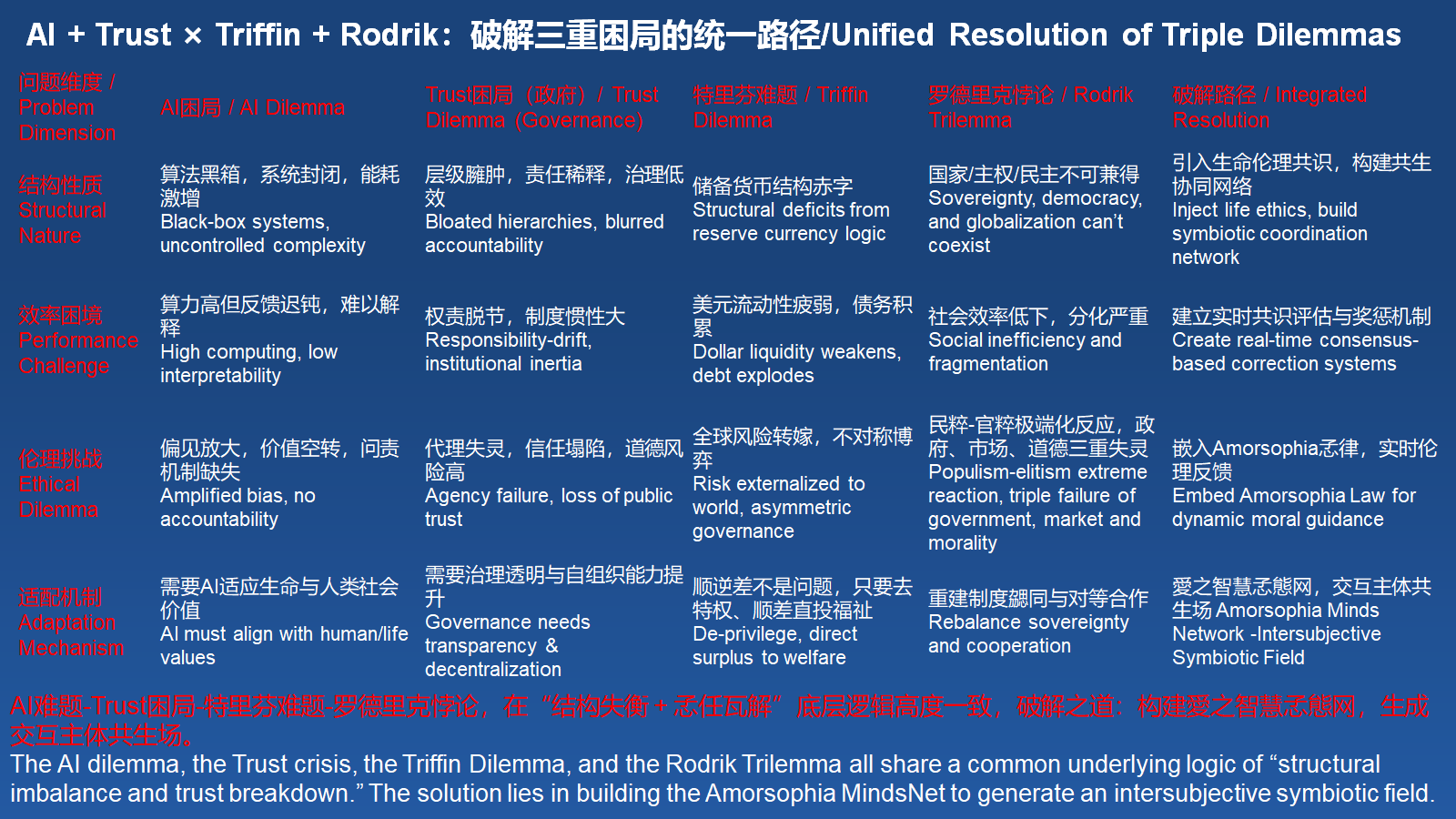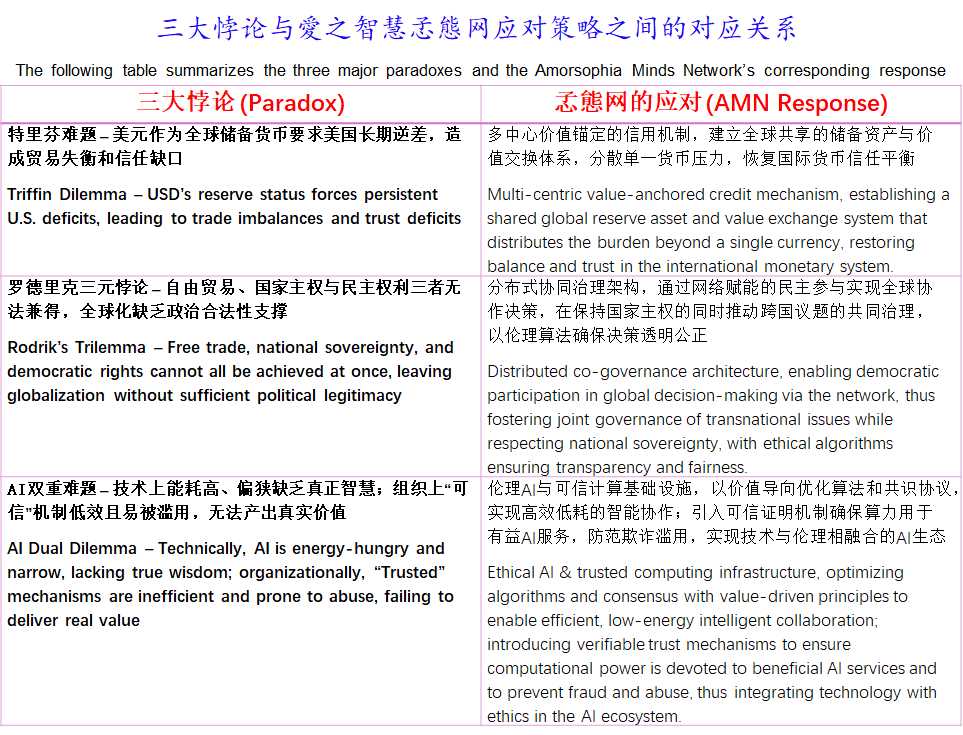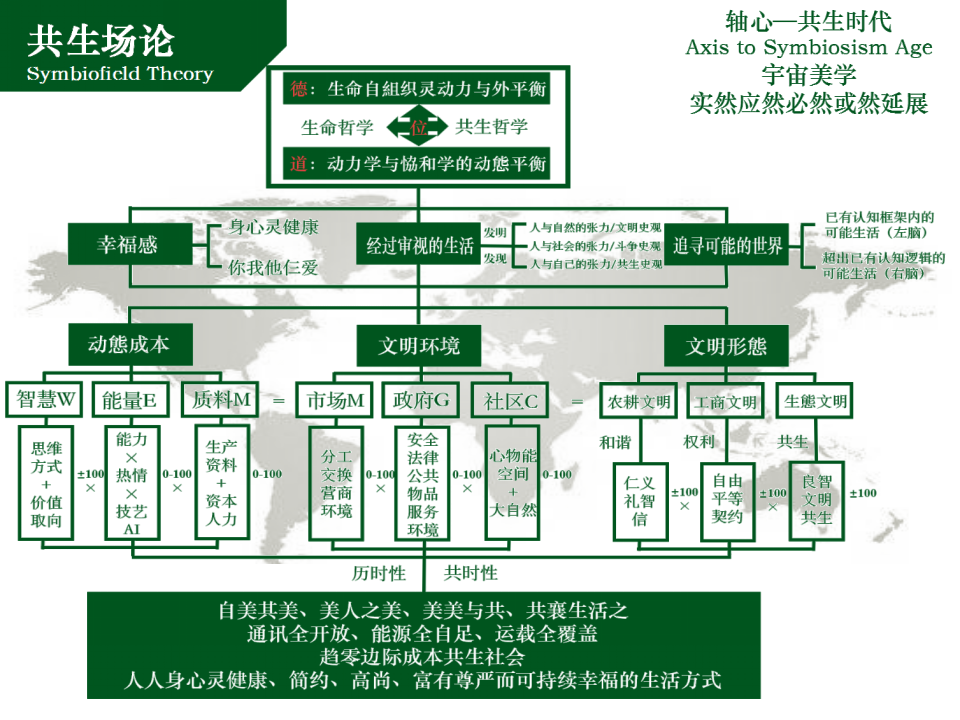New Articles
-
 经济学的认知偏蔽与分化催生新思维 2026/02/24
经济学的认知偏蔽与分化催生新思维 2026/02/24【共生经济学·前言】 经济学的认知偏蔽与分化催生新思维 The Cognitive Bias and Fragmentation of Economics as...
-
 如何面对“终极的免费午餐”? 2026/02/22
如何面对“终极的免费午餐”? 2026/02/22《共生经济学》自序 如何面对“终极的免费午餐”? How Should We Face the “Ultimate Free Lunch”? 一、从宇...
-
 全球共生范式下的现代正常国家 2026/02/17
全球共生范式下的现代正常国家 2026/02/17全球共生范式下的现代正常国家 Modern National Normalization under the Global Symbiotic Paradigm ...
-
 论殖官主义:政权更迭为何不能终结人民的苦难? 2026/02/16
论殖官主义:政权更迭为何不能终结人民的苦难? 2026/02/16论殖官主义:政权更迭为何不能终结人民的苦难? Chinese Reproductive Officialdom: Why Regime Change Has Not...
共生思想理论前沿
THE THEORY
-

-

-

-
 关于中文“共生”翻译及对应的人、事、物之说明
关于中文“共生”翻译及对应的人、事、物之说明关于中文“共生”翻译及对应的人、事、物之说明 ——Symbiosism:Charles Thomas Taylor &Qian hong又一次量子缠绕...
查看详细说明
Speech
-
 三大自组织货币的共生格局——宏观世界之数字货币 2021/07/08
三大自组织货币的共生格局——宏观世界之数字货币 2021/07/08三大自组织货币的共生格局 ——宏观世界之数字货币 钱 宏 The Institute for Global Symbiosism(...
-
 新汉字yǜ的释义 2019/11/16
新汉字yǜ的释义 2019/11/16语从金音玉(Yǜ):金口玉言,一诺千金,性人诚恳、执信; &n...
-
 钱宏:中国的真实经验与未来走向(凤凰博报专... 2019/11/16
钱宏:中国的真实经验与未来走向(凤凰博报专... 2019/11/16点击播放 中国的真实经验与未来走向《凤凰博报》专访钱宏主持人:...
破解三重悖论:全球化、Trust与AI的交叉困局
发布时间:2025/04/20 公司新闻 浏览次数:152
破解三重悖论:全球化、Trust与AI的交叉困局
Solving the Triple Paradox: The Intersecting Predicament of Globalization, Trust, and AI
Archer Hong Qian
全球化、信任(Trust)与人工智能(AI)正交织出当代世界的“三重悖论”。当今的全球化2.0范式在经济与治理层面遭遇结构性瓶颈,全球金融体系和国际秩序中的信任基础陷入动摇;与此同时,迅猛发展的AI技术本身也面临能耗失衡和伦理治理难题。这三重困局彼此叠加,导致全球体系亟需新的范式来加以变革和重构。
Globalization, trust, and artificial intelligence (AI) are together forming a “triple paradox” in today’s world. The current Globalization 2.0 paradigm faces structural bottlenecks in both economic and governance dimensions, as the foundation of trust in the global financial system and international order has been undermined. At the same time, rapidly advancing AI technology is encountering its own issues of unsustainable energy use and ethical governance challenges. These three predicaments compound one another, signaling an urgent need for a new paradigm to transform and rebuild the global system.

针对交叉困局的成因,我们提出“愛之智慧孞態网”(Amorsophia Minds Network)作为破局之道。 我们首先分析全球化2.0所面临的结构性悖论——从美元储备地位引发的贸易与信任失衡,到自由贸易、国家主权与民主人权难以兼得的全球化困境。随后,我们探讨当代AI发展与治理遭遇的双重难题:一方面是技术瓶颈(能耗过高、系统性偏差,以及数据算法并不等于真正的智慧),另一方面是“Trust”体系的低效与滥用(现有可信计算机制无法创造真实价值,反而滋生浪费和欺诈)。在此基础上,我们将**“罗德里克-Trust难题”定位为全球结构性信任崩解与AI适配失调之间的关键交汇点,进行简明阐释。最后,章节提出愛之智慧孞態网**这一交互主体共生机制与伦理算法基础设施,以回应上述三重困局,支撑全球化3.0的范式转型。
This chapter provides an overview of the origins of this intersecting predicament and proposes the “Amorsophia Minds Network” as a pathway to resolution. We will begin by examining the structural paradoxes facing Globalization 2.0 — from the trade and trust imbalances caused by the US dollar’s reserve status, to the globalization dilemma in which free trade, national sovereignty, and democracy/human rights cannot all be attained simultaneously. Next, we discuss the dual challenges confronting contemporary AI development and governance: on one hand, technical bottlenecks (excessive energy consumption, systemic biases, and the fact that data and algorithms are not equivalent to true wisdom), and on the other hand, inefficiencies and abuses in current “trust” systems (existing “trusted” computing mechanisms fail to create real value, instead breeding waste and fraud). On that basis, we identify the “Rodrik-Trust dilemma” as the critical intersection between the breakdown of structural trust globally and the misalignment of AI’s development structure, and we explain this convergence concisely. Finally, the chapter introduces the Amorsophia Minds Network, a mechanism of interactive-agent symbiosis underpinned by an ethical algorithmic infrastructure, to address the above triple predicament and support a paradigm shift toward Globalization 3.0.
全球化2.0的结构性瓶颈 (Structural Bottlenecks of Globalization 2.0)
全球化并非线性演进的过程,而是由技术和政治经济结构推动的数轮浪潮所构成 。当前的浪潮通常被称作“全球化2.0”,其特征是战后以美元为中心的布雷顿森林体系和自由贸易体系下的深度经济一体化。然而,全球化2.0正遭遇前所未有的结构性瓶颈:一方面,国际货币体系中存在“特里芬难题”,即作为全球储备货币发行国,美国不得不通过持续贸易逆差向世界提供流动性,这种两难局面导致了国内与国际目标的冲突及全球信任失衡 ;另一方面,全球治理层面存在“罗德里克三元悖论”,即民主、国家主权和高度经济一体化三者无法在同一体系中完全并存,各国在追求全球化时往往不得不牺牲民主决策或主权独立 。
Globalization has not followed a linear path, but rather has unfolded in waves driven by technological and politico-economic shifts . The current wave, often dubbed “Globalization 2.0,” has been characterized by deep economic integration under the post-war, US-dollar-centric Bretton Woods monetary order and a liberal free trade regime. However, Globalization 2.0 is now confronting unprecedented structural bottlenecks. On one hand, the international monetary system faces the “Triffin dilemma” – the issuer of the global reserve currency (the United States) must run persistent trade deficits to supply the world with liquidity, a Catch-22 that creates a conflict between short-term domestic and long-term international objectives and leads to imbalances in global trust . On the other hand, at the level of global governance there is “Rodrik’s trilemma,” which holds that democracy, national sovereignty, and deep economic integration are mutually incompatible within a single system – when pursuing globalization, nations inevitably sacrifice either democratic accountability or sovereign autonomy .
这些结构性矛盾交织在一起,加剧了全球化2.0的信用危机与治理困境。“特里芬难题”导致全球储备体系内在的不稳定:美国的持续逆差输出虽然维系了全球流动性,却削弱了对美元的长期信任基础。与此同时,“罗德里克悖论”体现为全球化的政治合法性赤字:当经济全球化凌驾于国家民主和主权之上时,各国民众对全球体系的信任随之下滑 。由此形成了一个交叉悖论——全球经济运行需要全球信任与合作,但现行体系却在结构上不断侵蚀这种信任。这正是全球化2.0难以为继的症结所在。
These structural contradictions intersect to exacerbate a crisis of credibility and governance in Globalization 2.0. The Triffin dilemma has introduced a fundamental instability into the global reserve currency system: while America’s ongoing deficits supply liquidity to sustain global trade, they gradually undermine long-term confidence in the US dollar. At the same time, Rodrik’s trilemma manifests as a political legitimacy deficit in globalization: when economic globalization is achieved at the expense of national democracy and sovereignty, public trust in the global system erodes . This creates an intersecting paradox—the functioning of the global economy requires trust and cooperation at a global scale, yet the current framework structurally undercuts that very trust. This is the core impasse making it difficult for the Globalization 2.0 model to sustain itself.
AI发展与治理的双重难题 (Dual Challenges in AI Development and Governance)
首先,在技术层面,当前AI的发展正遇到严峻的瓶颈和副作用。大规模模型的训练和部署需要消耗巨大的电力与算力资源,AI算法激增的能耗需求已经引发对可持续性的担忧 。此外,由于算法依赖于有限的数据和预设目标,AI系统往往缺乏整体性的系统思维,容易受到偏见影响或在复杂环境下产生偏差。这意味着单纯依靠数据和算法并不能产出真正的智慧——正如评论所指出,我们身处“大数据”时代却“缺乏智慧”,大量信息并未转化为有效决策能力 。这些技术局限表明,当今的AI虽然强大,但在能耗效率、认知深度和价值判断方面仍存在不可忽视的短板。
First, on the technical front, current AI development is encountering serious bottlenecks and side effects. Training and deploying large-scale models require enormous electricity and computing resources, and the surging energy demands of AI algorithms have raised concerns about sustainability . In addition, because algorithms rely on finite datasets and preset objectives, AI systems often lack holistic systems thinking, leaving them prone to biases and errors when faced with complex real-world contexts. In other words, simply piling up data and algorithms does not yield true wisdom – as commentators have noted, we are “drowning in data but starved for wisdom,” with a flood of information not translating into sound decision-making . These technical limitations indicate that despite AI’s impressive capabilities, today’s systems still suffer from critical shortcomings in energy efficiency, cognitive depth, and value judgment.
其次,在组织与信任层面,AI的治理和应用生态同样陷入了“Trust”的困境。当前旨在建立去中心化信任的计算机制(如区块链)本应为数据和AI提供可信的价值交换基础,但现实情况却不尽如人意。一方面,此类机制往往付出高昂的资源代价——以区块链为例,其共识算法需要消耗极大的算力和能源,Bitcoin等公链的“挖矿”被形容为史上最耗能的共识机制 。另一方面,在缺乏有效监管的环境下,打着“信任”旗号的新技术屡屡被滥用,变成牟利和欺诈的工具;许多所谓区块链应用场景实际只是炒作噱头,大量资金被引诱注入泡沫之中,最终“被收割”的往往是缺乏判断力的大众投资者 。换言之,当前并未形成真正可信且创造实际价值的计算机制:资源被大量消耗,却未建立起应有的信任产出。这种组织层面的低效和欺诈进一步阻碍了AI与数字经济潜能的发挥,使得技术无法转化为真实生产力。
Secondly, on the organizational and trust front, AI’s governance and application ecosystem have likewise fallen into a “trust” dilemma. Presently, ostensibly trust-building decentralized computing mechanisms (such as blockchains) were intended to provide a reliable foundation for value exchange in data and AI networks, but in practice the results have been problematic. On the one hand, such mechanisms often come with enormous resource costs – for example, blockchain consensus algorithms consume vast computational power and energy; Bitcoin’s mining has been described as the most energy-intensive consensus mechanism ever devised . On the other hand, in the absence of effective oversight, new technologies under the banner of “trust” are frequently misused as tools for profit and fraud. Many so-called blockchain “use-cases” have turned out to be hype, where large sums of capital were lured into speculative bubbles, and ultimately it is often poorly informed participants who get exploited . In short, we have yet to establish a truly trustworthy computing mechanism that creates real value: resources are being devoured without delivering commensurate trusted outcomes. These inefficiencies and fraudulent behaviors at the organizational level further impede AI and the digital economy from reaching their potential, as technology fails to translate into genuine productivity under a broken trust framework.
“罗德里克-Trust难题”的交汇点 (The “Rodrik-Trust Dilemma” Intersection)
在上述分析中可以看到,一个贯穿始终的关键词是“信任”。全球化2.0的结构性瓶颈实质上是全球信任机制的失灵:无论是储备货币体系还是全球治理,都未能提供各方信任所需的公平与稳定架构 。与此同时,AI发展与治理的双重难题表明,新技术未能嵌入适当的信任机制:技术层面的指数级进步缺乏道德与价值约束,组织层面的信任工具又效率低下且屡遭滥用。二者在结构上形成一个恶性循环:旧的全球信任架构在瓦解,新的数字智能体系却无力替代,从而出现了“罗德里克-Trust难题”这一关键交汇点。它反映出当前世界的一个基本矛盾:国家层面的民主与主权诉求(罗德里克三元悖论的一端)与全球协作所需的信任基础之间出现裂痕,而高速发展的AI技术由于缺乏全球协调与可信治理,反过来加剧了这种裂痕 。简单来说,全球体系的信任崩解与AI体系的失配彼此交织,成为横亘在全球化3.0道路上的关键障碍。
Throughout the above analysis, a unifying theme has been “trust.” The structural bottlenecks of Globalization 2.0 essentially boil down to a failure of global trust mechanisms: neither the reserve currency system nor the current mode of global governance has provided a fair and stable architecture sufficient for sustaining mutual trust . At the same time, the dual challenges in AI development and governance indicate that new technologies have not been embedded within appropriate trust frameworks: explosive technical progress lacks moral and value constraints, and the available trust tools at the organizational level are inefficient and often misused. These factors form a vicious structural cycle: the old architecture of global trust is disintegrating, and the emerging digital intelligence regime is not yet capable of replacing it. This gives rise to what we term the “Rodrik-Trust dilemma,” the critical intersection of these issues. It highlights a fundamental contradiction in the world today: the demands of national-level democracy and sovereignty (one facet of Rodrik’s trilemma) are diverging from the trust foundation needed for global cooperation, and the rapid rise of AI, in the absence of globally coordinated and trustworthy governance, is exacerbating this rift . In short, the collapse of structural trust in the global system and the misalignment of the AI ecosystem are intertwined, standing together as a key barrier on the path toward Globalization 3.0.
愛之智慧孞態网:共生机制与伦理算法的全球化3.0方案 (Amorsophia Minds Network: A Symbiotic Ethical Algorithm Solution for Globalization 3.0)
面对全球化、Trust与AI交叉形成的三重困局,迫切需要一种能够同时重建信任基础和提升智能协作的新型架构。愛之智慧孞態网(Amorsophia Minds Network)正是为此目的而提出的愿景方案。其核心理念是在技术与人文的交汇处构建一个交互主体共生机制,即让多元主体(包括各国政府、组织、个人乃至AI智能体)在一个网络中协同共生、共同演化;同时以伦理算法为系统基础设施,通过算法嵌入人类共同的价值观和道德准则,确保网络运行朝向公正、可持续的方向演进。“Amor”源自拉丁语,意为爱;“Sophia”意为智慧。顾名思义,愛之智慧孞態网旨在将“爱”(即伦理关怀、信任合作)与“智慧”(即智能技术、系统思维)相融合,打造一个既有温度又有理性的新型全球数字生态。
Confronted with the triple predicament at the intersection of globalization, trust, and AI, there is an urgent need for a new kind of architecture that can rebuild the foundation of trust while enhancing intelligent collaboration. The Amorsophia Minds Network is a visionary proposal designed to meet this need. Its core concept is to construct a mechanism of interactive-agent symbiosis at the confluence of technology and the humanities — that is, to enable diverse agents (including national governments, organizations, individuals, and even AI entities) to collaborate and co-evolve within a shared network. This network is underpinned by an ethical algorithmic infrastructure that encodes universal human values and moral principles into its algorithms, ensuring that the system’s operations evolve in a just and sustainable direction. “Amor” is Latin for love, and “sophia” means wisdom. As the name suggests, the Amorsophia Minds Network seeks to fuse “love” (i.e. ethical care and cooperative trust) with “wisdom” (i.e. intelligent technology and systems thinking) to create a new global digital ecosystem that embodies both empathy and rationality.
在实践层面,愛之智慧孞態网将通过一系列创新设计来化解前述三大悖论,为全球化3.0提供支撑。首先,在货币与价值层面,孞態网引入多中心的价值锚定机制,取代对单一国家货币的过度依赖,促进更平衡的全球信用创造。这有望缓解特里芬难题下的结构失衡,让全球储备体系建立在共同信任而非单极信用之上。其次,在治理架构上,孞態网倡导协同治理和分布式决策。通过网络算法将民主参与和本地自主权融入全球协作框架,各主体在保有自主性的同时共享AI赋能的全球智能决策支持,从而部分破解罗德里克三元悖论,在国家主权与全球公共利益之间取得新平衡。再次,在AI技术应用上,孞態网作为伦理算法基础设施,致力于实现可信的智能协作:网络中的AI代理将遵循透明、公平的算法规则,相互校验与监督,减少单点失误和偏见;同时结合新型共识协议,实现高效的“可信计算”,避免现有链上计算的浪费,使算力投入直接用于有社会价值的AI服务。通过这些措施,愛之智慧孞態网试图将“信任”重新注入数字时代的全球化进程,为全球化3.0奠定技术与伦理并重的基础——一个在信任中运作的智能地球村,在爱与智慧的引领下走出当前的交叉困局。
At a practical level, the Amorsophia Minds Network would deploy a series of innovative designs to resolve the aforementioned three paradoxes and provide the foundation for Globalization 3.0. First, in the monetary and value domain, the network introduces a multi-centric value anchoring mechanism to reduce over-reliance on any single national currency and foster a more balanced creation of global credit. This is expected to alleviate the structural imbalance highlighted by the Triffin dilemma, rebuilding the global reserve system on shared trust rather than a unipolar currency. Second, in terms of governance structure, the network advocates collaborative governance and distributed decision-making. Its architecture would embed democratic participation and local autonomy into a global cooperation framework via network algorithms, allowing each stakeholder to retain sovereignty while sharing AI-augmented collective decision support at the global level. In doing so, it seeks to partially solve Rodrik’s trilemma by striking a new balance between national sovereignty and global public interest. Third, regarding AI technology and its applications, the network as an ethical algorithmic infrastructure aims to enable trustworthy intelligent collaboration: AI agents in the network would operate under transparent and fair algorithmic rules, verifying and supervising each other to minimize individual biases or errors. Coupled with new consensus protocols, the network can achieve efficient “trusted computing,” avoiding the waste of current blockchain-style computations by directing computational power toward AI services with genuine social value. Through these measures, the Amorsophia Minds Network aspires to re-infuse trust into the process of globalization in the digital age, establishing a foundation for Globalization 3.0 that gives equal weight to technology and ethics — a kind of intelligent global village operating on trust, guided by love and wisdom to overcome today’s intersecting predicaments.

表总结了上述三大悖论与愛之智慧孞態网应对策略之间的对应关系
The following table summarizes the three major paradoxes and the Amorsophia Minds Network’s corresponding response
总结而言,破解全球化、Trust与AI交织的三重悖论,需要在全球尺度重构信任与智慧并举的基础设施。愛之智慧孞態网以交互主体共生和伦理算法为支柱,正是对这一使命的探索:通过重建全球信任机制并提升协同智能,它为全球化3.0的宏伟转型提供了可能的道路。这一范式的转变有望将人类带入一个“爱与智慧”引领的新纪元,在化解当前困局的同时,实现更加包容、可持续的全球发展。
In summary, overcoming the triple paradox intertwining globalization, trust, and AI requires rebuilding a global infrastructure that interweaves trust and wisdom. The Amorsophia Minds Network, grounded in interactive symbiosis and ethical algorithms, is an exploratory blueprint for this mission: by restoring structural trust worldwide and enhancing collaborative intelligence, it offers a potential path for the bold transformation toward Globalization 3.0. This paradigm shift promises to usher humanity into a new era guided by “love and wisdom,” one that resolves the current predicament while enabling a more inclusive and sustainable form of global development.
2025年4月16日
参考文献 (Sources): 以上引文均据公开资料整理:
《告别自由贸易乌托邦,交互参与全球化3.0》,Farewell to the Free Trade Utopia, Embracing Interactive Participation in Globalization 3.0
http://symbiosism.com.cn/9907.html
《全球化3.0的价值观:从重集体理念,到重个体生命——Transform of Trust组织平台,从降本赋能开始》,http://symbiosism.com.cn/9768.html
《哲学3.0宣言——在交互主体共生中追寻可能的世界》The Philosophy 3.0 Manifesto: Seeking Possible Worlds through Intersubjective Symbiosis
《<米兰报告>的缺憾:川普对等关税与全球化3.0的责任召唤——共生思维:破解“特里芬难题”ד罗德里克悖论”双重张力》The Shortcomings of the Milan Report: Trump’s Reciprocal Tariffs and the Responsibility Awakening of Globalization 3.0—Symbiotic Minds:Navigating the Dual Tensions of the “Triffin Dilemma” and the “Rodrik Trilemma” ,http://symbiosism.com.cn/9995.html













您好!请登录
已有0评论
购物盒子